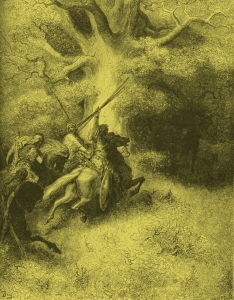From the Introduction to Ten Parts in the King

There is an account in the scriptures that presents a prophetic picture of this process. It concerns the aftermath of the civil war in Israel that erupted when Absalom usurped the throne from his father David (2 Samuel 15-18). When David’s loyal forces had defeated the rebels in battle on the eastern side of the Jordan River, the king prepared to return across the river to regain his throne in Jerusalem. This is where we find a peculiar turn of events:
Then King David sent to Zadok and Abiathar the priests, saying, “Speak to the elders of Judah, saying, ‘Why are you the last to bring the king back to his house, since the word of all Israel has come to the king, even to his house? You are my brothers; you are my bone and my flesh. Why then should you be the last to bring back the king?’ Say to Amasa, ‘Are you not my bone and my flesh? May God do so to me, and more also, if you will not be commander of the army before me continually in place of Joab.’” Thus he turned the hearts of all the men of Judah as one man, so that they sent word to the king, saying, “Return, you and all your servants.” The king then returned and came as far as the Jordan. And Judah came to Gilgal in order to go to meet the king, to bring the king across the Jordan. (2 Samuel 19:11-15)
Why would Judah not reclaim their king? Perhaps because the rebellion against him originated from within Judah; when Absalom claimed the throne, he did so from Hebron, the city of Judah where David first reigned over his own tribe and House (2 Samuel 5:4-5, 15:7-12). Doubtless there was a large degree of shame involved, particularly on the part of Amasa, the Judean commander of Absalom’s army. Nevertheless, the king would not return until his own kin acknowledged him and welcomed him back – something which another son of David said many centuries later:
Jerusalem, Jerusalem, who kills the prophets and stones those who are sent to her! How often I wanted to gather your children together, the way a hen gathers her chicks under her wings, and you were unwilling. Behold, your house is being left to you desolate! For I say to you, from now on you will not see Me until you say, “Blessed is He who comes in the name of the Lord!” (Matthew 23:37-39)
Today, the Christian world acknowledges Yeshua Son of David as Messiah and King of Israel, but oddly enough does not acknowledge their own part in that same Kingdom. Jews, for the most part, do not acknowledge Yeshua as anyone of importance to them (other than inspiring centuries of virulent anti-Semitism), but they jealously guard the nation of Israel and their place within it. That, too, is reminiscent of the aftermath of Absalom’s rebellion:
Now the king went on to Gilgal, and Chimham went on with him; and all the people of Judah and also half the people of Israel accompanied the king. And behold, all the men of Israel came to the king and said to the king, “Why had our brothers the men of Judah stolen you away, and brought the king and his household and all David’s men with him over the Jordan?” Then all the men of Judah answered the men of Israel, “Because the king is a close relative to us. Why then are you angry about this matter? Have we eaten at all at the king’s expense, or has anything been taken for us?” But the men of Israel answered the men of Judah and said, “We have ten parts in the king, therefore we also have more claim on David than you. Why then did you treat us with contempt? Was it not our advice first to bring back our king?” Yet the words of the men of Judah were harsher than the words of the men of Israel. (2 Samuel 19:40-43, emphasis added)
The Ten Tribes today are becoming aware of their identity. That is the fruit of the worldwide Torah Awakening sweeping through Christianity. These newly aware Hebrews are beginning to look to their brethren of Judah and say, “We have ten parts in the king.”
Some, like our ancestors, continue to say, “Therefore we also have more claim on David than you.” They do not speak for all of us. A growing number of modern-day Ephraimites have recognized that our return to full fellowship with our King means a return in humility to reconcile with the Jewish brethren we have envied all these centuries, and who have suffered immeasurably from the fruit of our envy.
If the testimony of scripture is true, then there are two parts to the nation of Israel – two Houses, each with a distinct mission, but together destined to complete a single, united Kingdom in the age of Messiah’s reign from Zion.
Our task is not to convince, but to present the evidence.
Your task is to weigh the evidence for yourself to discern if these things are true.

If the Church was to preach the “Gospel of the Kingdom”, as the Apostle Paul did in Rome (see Acts 28:23), it would have to include the entire history of Israel from the Torah and the Prophets. “Ten Parts in the King” brings you face to face with this reality in a comprehensive and multifaceted fashion. To ignore these clearly presented scriptural facts, is to do injustice to the Word of God.
Ephraim and Rimona
LikeLike